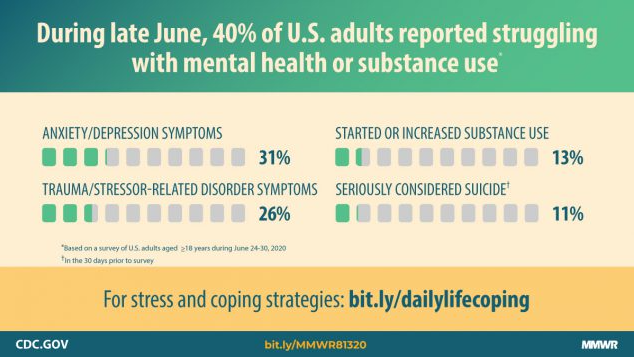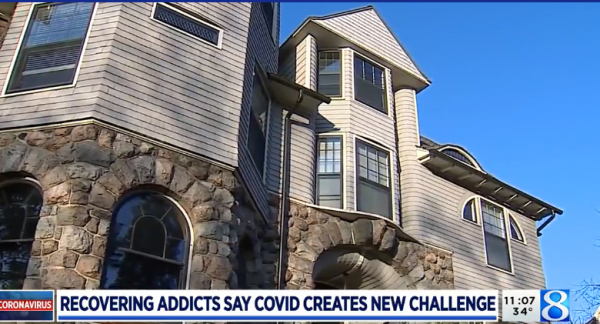Substance Use, Mental Health, COVID-19 – the Connection

The urgent need for expanded interventions, treatment, and connection involves the entire community.
A recent Centers for Disease Control and Prevention (CDC) Report verifies what we have been hearing and reading over the past ten months of the COVID-19 pandemic. COVID-19 has negatively impacted our mental health. But with nearly a year of social constraints and disease diagnosis, the data coming in are showing some interesting new connections between COVID-19 and elevated mental health and substance use concerns.

June 24–30, 2020 Survey of adults over 18 – CDC
First, CDC survey data show that reported incidences of anxiety and depression mirrored COVID-19 cases in early summer of this year and again in surveys in September and October. Spikes in COVID-19 cases markedly increased the reporting of adverse mental and behavioral health conditions. Similarly, with lower viral spread, mental health outcomes markedly improved.
Second, there are disproportionately worse outcomes for certain populations.
During June 24–30, 2020, U.S. adults reported considerably elevated adverse mental health conditions associated with COVID-19. Younger adults, racial/ethnic minorities, essential workers, and unpaid adult caregivers reported having experienced disproportionately worse mental health outcomes, increased substance use, and elevated suicidal ideation.
CDC Mental Health, Substance Use, and Suicidal Ideation During the CODIC-19 Pandemic
What are the conclusions?
The CDC acknowledges the broad impact of COVID-19 on mental and behavioral health, and highlights the need to prevent and treat the resultant conditions. The urgent need for expanded interventions, treatment, and connection involves the entire community. The CDC’s conclusions:
- Identify and prioritize at risk populations
- Increase access to resources for diagnosis and treatment
- Expand the use of telehealth for treatment
- Study the “drivers of adverse mental and behavioral health” such as, isolation, unemployment, lack of school structure, various forms of violence, etc.
- Community intervention and economic supports
- Promotion of social connectedness
- Early intervention and identification of COVID-19 and trauma and stressor-related disorder (TSRD)
- Accessible social support, comprehensive treatment, and harm reduction services for substance use
Periodic assessment of mental health, substance use, and suicidal ideation should evaluate the prevalence of psychological distress over time. Addressing mental health disparities and preparing support systems to mitigate mental health consequences as the pandemic evolves will continue to be needed urgently.
CDC Mental Health, Substance Use, and Suicidal Ideation During the CODIC-19 Pandemic
For more information, click the links below:
Mental Health, Substance Use, and Suicidal Ideation During the COVID-19 Pandemic — United States, June 24–30, 2020
CDC Weekly / August 14, 2020 / 69(32);1049–1057
Anxiety and depression are following a remarkably similar curve to Covid-19 cases
By Isaac Sebenius, Dec 15, 2020 VOX



